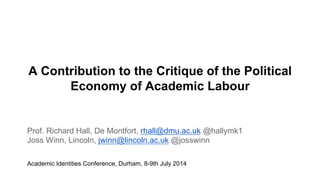A Contribution to the Critique of the Political Economy of Academic Labour
- 1. A Contribution to the Critique of the Political Economy of Academic Labour Prof. Richard Hall, De Montfort, rhall@dmu.ac.uk @hallymk1 Joss Winn, Lincoln, jwinn@lincoln.ac.uk @josswinn Academic Identities Conference, Durham, 8-9th July 2014
- 2. English universities today ¡ñ? Increasingly¡ o? Privatised o? Marketised o? Financialised o? Instrumentalised ¡ñ? Regulated by the Department of Business and Innovation ¡ñ? Performance measured by economic ¡®impact¡¯ and ¡®student satisfaction¡¯ ¡ñ? They are a means of production (knowledge) and reproduction (labour) ¡ñ? Unproductive labour is being transformed into directly productive labour through the ¡®real subsumption¡¯ of the university to the capitalist mode of production ¡ñ? What, now, is the social role of academic labour?
- 3. ¡®Labour¡¯ as a critical category ¡ñ? Commodity-form (use-value and exchange value) ¡ñ? Dual character of labour expressed in the commodity-form (concrete and abstract labour) ¡ñ? Labour power (a commodity) is bought for a wage ¡ñ? The wage reflects the value of labour power i.e. the ¡®necessary labour time¡¯ for subsistence ¡ñ? More value can be uniquely produced by labour through extending working hours or cutting wages = ¡®exploitation¡¯ ¡ñ? ¡®Necessary labour time¡¯, ¡®surplus labour time¡¯, ¡®absolute surplus value¡¯, ¡®relative surplus value¡¯. ¡ñ? As productivity of labour increases, the value of labour power decreases ¡ñ? With the increase in the ratio of ¡®dead labour¡¯ over ¡®living labour¡¯, capital produces a surplus population (precarious, under and unemployed labour)
- 4. ¡®Immaterial labour¡¯ ¡ñ? ¡®Intellectual, affective-emotional and techno-scientific activity¡¯ (Negri and Hardt 1994) ¡ñ? ¡®audio-visual production, advertisement, fashion, software-production, photography, cultural activities and so on¡¯ (Maurizio Lazzarato, 1993) ¡ñ? The term is used strategically, to unite workers, yet results in confusing abstract labour, intellectual labour, digital labour, and virtual work. Conflates the labour process with its product. ¡ñ? ¡°In order to examine the connection between intellectual production and material production it is above all necessary to grasp the latter itself not as a general category but in definite historical form. Thus for example different kinds of intellectual production correspond to the capitalist mode of production and to the mode of production of the Middle Ages. If material production itself is not conceived in its specific historical form, it is impossible to understand what is specific in the intellectual production corresponding to it and the reciprocal influence of one on the other. Otherwise one cannot get beyond inanities.¡± (Marx, MECW 31, 182) See Huag (2009) for references and broader critical discussion of this term.
- 5. ¡®Digital labour¡¯ Alienated and exploited digital work which is defined by its association with the ICT industry; it creates value for that industry. It incorporates all physiological aspects of the human body, its relationship to nature and machines. It is objectified in digital goods as well as services that are reliant on digital goods. (Paraphrasing Fuchs 2014) As such, from ¡®digital slaves¡¯ to ¡®digital scholars¡®, the social form of labour remains the same, even though the way in which it appears in particular, concrete case studies, may look quite different.
- 6. Method: From abstract to concrete ¡°The concrete is concrete because it is the concentration of many determinations, hence unity of the diverse. It appears in the process of thinking, therefore, as a process of concentration, as a result, not as a point of departure, even though it is the point of departure in reality and hence also the point of departure for observation and conception. ¡ the abstract determinations lead towards a reproduction of the concrete by way of thought.¡± (Marx, 1993, 101)
- 7. From being to doing ¡ñ? Moten and Harney (1998) argue that we need to view academic work as an activity rather than a position. ¡ñ? We have a material connection between each other and our students. ¡ñ? Need to focus on what it means to do academic labour rather than what it means to be an academic worker. ¡ñ? Must be grounded in a theoretical framework that is adequate to the task of analysing capitalist social relations. ¡ñ? Need to focus on the university as a means of production for capital and its exploitation of the divided, social, co-operative labour of academics and students.
- 8. Against academic labour ¡ñ? Start from an abstract analysis and move to concrete ¡ñ? Question the social form of academic labour before its content ¡ñ? It is the activity (doing) of labour which produces academic identity (being) ¡ñ? Subjectivity in capitalism arises from the imperative to create value from labour ¡ñ? Hypostasizing labour as ¡®identity¡¯ will lead to a sense of helplessness and blind resistance
- 9. References Fuchs, Christian (2014) Digital Labour and Karl Marx, Routledge. Haug, W.F. (2009) Immaterial Labour, Historical Materialism 17 (2009) 177¨C 185 Marx, Karl (1976) Capital Volume 1, Penguin Classics. Marx, Karl (1993) Grundrisse, Penguin Classics. Moten, Fred and Harney, Stefano (1998) Doing Academic Work, in Martin, Randy (Ed) Chalk Lines: The politics of work in the managed university, 154-180 See also: Richard Hall: http://www.richard-hall.org/tag/labour/ Joss Winn: http://josswinn.org/tag/academic-labour/
- 10. A Contribution to the Critique of the Political Economy of Academic Labour Prof. Richard Hall, De Montfort, rhall@dmu.ac.uk @hallymk1 Joss Winn, Lincoln, jwinn@lincoln.ac.uk @josswinn Academic Identities Conference, Durham, 8-9th July 2014










